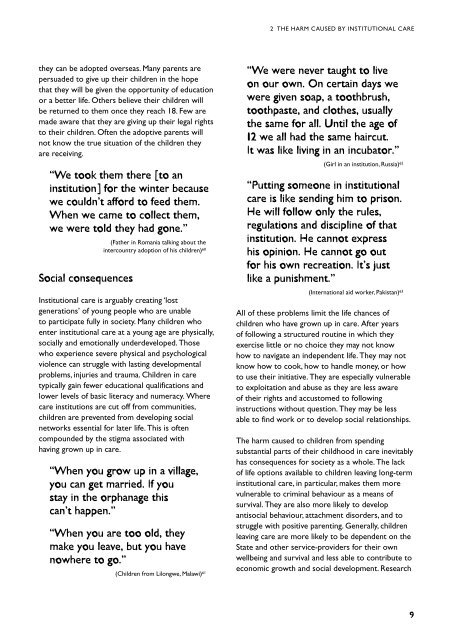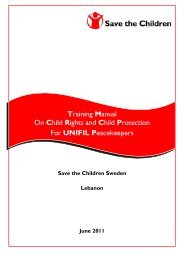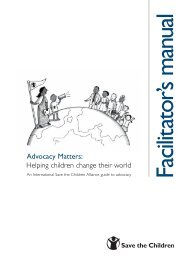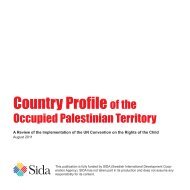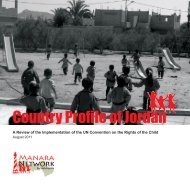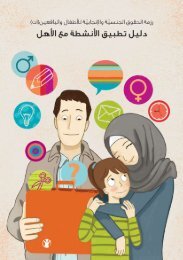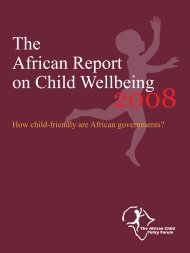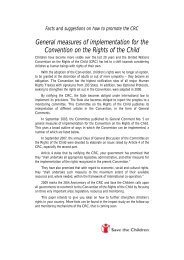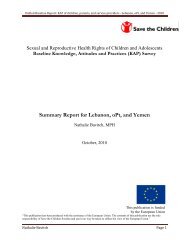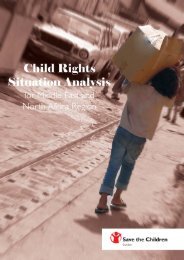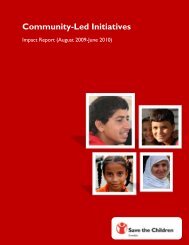Keeping Children Out of Harmful Institutions - Save the Children
Keeping Children Out of Harmful Institutions - Save the Children
Keeping Children Out of Harmful Institutions - Save the Children
You also want an ePaper? Increase the reach of your titles
YUMPU automatically turns print PDFs into web optimized ePapers that Google loves.
<strong>the</strong>y can be adopted overseas. Many parents are<br />
persuaded to give up <strong>the</strong>ir children in <strong>the</strong> hope<br />
that <strong>the</strong>y will be given <strong>the</strong> opportunity <strong>of</strong> education<br />
or a better life. O<strong>the</strong>rs believe <strong>the</strong>ir children will<br />
be returned to <strong>the</strong>m once <strong>the</strong>y reach 18. Few are<br />
made aware that <strong>the</strong>y are giving up <strong>the</strong>ir legal rights<br />
to <strong>the</strong>ir children. Often <strong>the</strong> adoptive parents will<br />
not know <strong>the</strong> true situation <strong>of</strong> <strong>the</strong> children <strong>the</strong>y<br />
are receiving.<br />
“We took <strong>the</strong>m <strong>the</strong>re [to an<br />
institution] for <strong>the</strong> winter because<br />
we couldn’t afford to feed <strong>the</strong>m.<br />
When we came to collect <strong>the</strong>m,<br />
we were told <strong>the</strong>y had gone.”<br />
Social consequences<br />
(Fa<strong>the</strong>r in Romania talking about <strong>the</strong><br />
intercountry adoption <strong>of</strong> his children) 60<br />
Institutional care is arguably creating ‘lost<br />
generations’ <strong>of</strong> young people who are unable<br />
to participate fully in society. Many children who<br />
enter institutional care at a young age are physically,<br />
socially and emotionally underdeveloped. Those<br />
who experience severe physical and psychological<br />
violence can struggle with lasting developmental<br />
problems, injuries and trauma. <strong>Children</strong> in care<br />
typically gain fewer educational qualifications and<br />
lower levels <strong>of</strong> basic literacy and numeracy. Where<br />
care institutions are cut <strong>of</strong>f from communities,<br />
children are prevented from developing social<br />
networks essential for later life. This is <strong>of</strong>ten<br />
compounded by <strong>the</strong> stigma associated with<br />
having grown up in care.<br />
“When you grow up in a village,<br />
you can get married. If you<br />
stay in <strong>the</strong> orphanage this<br />
can’t happen.”<br />
“When you are too old, <strong>the</strong>y<br />
make you leave, but you have<br />
nowhere to go.”<br />
(<strong>Children</strong> from Lilongwe, Malawi) 61<br />
2 THE HARM CAUSED BY INSTITUTIONAL CARE<br />
“We were never taught to live<br />
on our own. On certain days we<br />
were given soap, a toothbrush,<br />
toothpaste, and clo<strong>the</strong>s, usually<br />
<strong>the</strong> same for all. Until <strong>the</strong> age <strong>of</strong><br />
12 we all had <strong>the</strong> same haircut.<br />
It was like living in an incubator.”<br />
(Girl in an institution, Russia) 62<br />
“Putting someone in institutional<br />
care is like sending him to prison.<br />
He will follow only <strong>the</strong> rules,<br />
regulations and discipline <strong>of</strong> that<br />
institution. He cannot express<br />
his opinion. He cannot go out<br />
for his own recreation. It’s just<br />
like a punishment.”<br />
(International aid worker, Pakistan) 63<br />
All <strong>of</strong> <strong>the</strong>se problems limit <strong>the</strong> life chances <strong>of</strong><br />
children who have grown up in care. After years<br />
<strong>of</strong> following a structured routine in which <strong>the</strong>y<br />
exercise little or no choice <strong>the</strong>y may not know<br />
how to navigate an independent life. They may not<br />
know how to cook, how to handle money, or how<br />
to use <strong>the</strong>ir initiative. They are especially vulnerable<br />
to exploitation and abuse as <strong>the</strong>y are less aware<br />
<strong>of</strong> <strong>the</strong>ir rights and accustomed to following<br />
instructions without question. They may be less<br />
able to find work or to develop social relationships.<br />
The harm caused to children from spending<br />
substantial parts <strong>of</strong> <strong>the</strong>ir childhood in care inevitably<br />
has consequences for society as a whole. The lack<br />
<strong>of</strong> life options available to children leaving long-term<br />
institutional care, in particular, makes <strong>the</strong>m more<br />
vulnerable to criminal behaviour as a means <strong>of</strong><br />
survival. They are also more likely to develop<br />
antisocial behaviour, attachment disorders, and to<br />
struggle with positive parenting. Generally, children<br />
leaving care are more likely to be dependent on <strong>the</strong><br />
State and o<strong>the</strong>r service-providers for <strong>the</strong>ir own<br />
wellbeing and survival and less able to contribute to<br />
economic growth and social development. Research<br />
9


